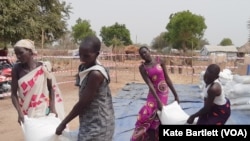Authorities in Eastern Equatoria State are raising concern over what they say is impending hunger. A poor harvest last season caused by this year’s drought coupled with skyrocketing food prices makes it difficult for many families to put food on the table, say officials.
Many people in the state are suffering because their crops did not yield any food from the first farming season said Margret Oliver, paramount chief of Moli Tokuro in Eastern Equatoria. Communities have begun cultivating for the second season but will not have food for the next few months, according to Oliver.
Some families in Torit, Kapoeta and Nimule have resorted to selling firewood and groundnuts in order to feed their children.
“The issue of hunger is very serious to the extent that if we don’t cut firewood and charcoal to sell so that we are able to buy a cup of maize flour to feed our children [they will have nothing to eat]. This is what we are going through if at all it is we the adults then that would be okay, but what is so bad about this situation is that we have small children who can’t bear hunger," Oliver told South Sudan in Focus.
Felix Mackumoi, paramount chief of the Pagari Payam, said members of his community are struggling to feed their children after most of their crops were destroyed by drought or by elephants from Nimule National Park.
“Since 2017, we in the Pagari Payam areas, we are suffering from the issues of elephants destroying our crops. Here we are surviving on selling charcoal and other things,” Mackumoi told South Sudan in Focus.
Eastern Equatoria State Information Minister Patrick Otin called the economic conditions “very worrying” since most communities’ crops were destroyed by drought, and they rely primarily on farming for their livelihood.
“Those who didn’t cultivate especially those who are in Torit or big towns, those are the people who are going to be affected by the hunger because they are depending on buying things from the markets,” Otin told South Sudan in Focus.
Otin encouraged residents to take up farming, saying it’s the only tool they have for survival.
“Every family should cultivate something so they can eat and they sell the surplus because if we cultivate, we will reduce the issue of hunger, the number one thing in our lives,” Otin told VOA.
Noting the rainfall in Torit on Monday, Otin advised residents to “take the hoe to their garden and dig because we need food.”
The state ministry of agriculture and U.N. Food and Agriculture Organization (FAO) has distributed seeds to residents to help reduce the hunger crisis, said Otin.
Meshack Malo, country representative for the FAO in South Sudan, said his agency is also giving farming tools to residents to help them take advantage of the current rains to plant crops.
Inter-communal conflict and cattle movements have affected FAO’s seed distribution and farming programs in some regions, added Malo.
“Lack of peace will definitely affect negatively some of these areas. Eastern Equatoria was not able to produce enough food for itself. We see that there is a very close inter-relationship between food, peace and lack of it, so we need all concerted efforts so that farmers and farming communities can be back to their lands and be able to plant,” Malo told VOA.
Malo urged national government leaders to intervene where there are inter-communal conflicts to avoid mass displacement of people and to allow people to plant crops during the rainy season.
